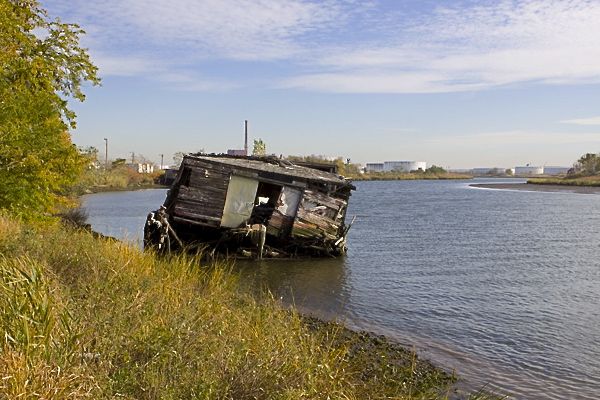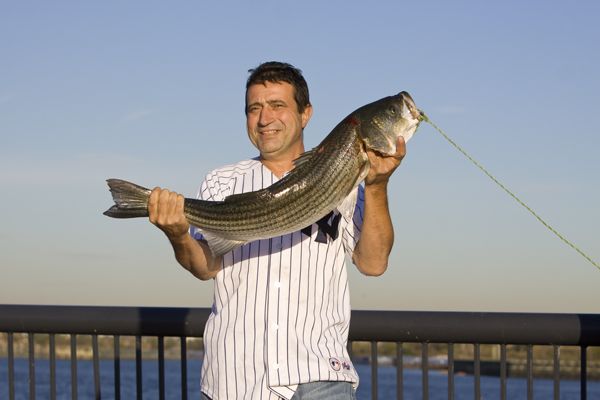That headline about sums it up.
The Arthur Kill and everything that used to be there before the Exxon petro-chemical- industrial-disposal complex is just a “lost use” – so eloquent a term.
EPA suggests it’s no use on lost use – and lost use actually protects public health. Isn’t that grand?:
Trespassers and Recreation
The Bayway Refinery is an active industrial facility, and operates 24-hours a day, 365-days a year. The refinery maintains a comprehensive site security system that includes perimeter fencing with warning signs, controlled gate access and 24-hour on-site security. The refinery also has a security policy establishing locations and procedures for admittance to the site, including maritime security. Because of these measures, trespassers and/or recreators do not have access to the facility. Since access is prevented, human exposure to any contaminants in surface soil and sediments is not possible. Therefore, the trespasser and recreation exposure pathways are not complete.
DEP is seeking economic damages for “lost use” – how do you put a price tag on that?
Reminds me of the Marxist economic distinction between “use value” versus “exchange value”.
Here’s David Harvey on that:
One of the contradictions you focus on is that between the use and exchange value of a commodity. Why is this contradiction so fundamental to capitalism, and why do you use housing to illustrate it?
All commodities have to be understood as having a use value and exchange value. If I have a steak the use value is that I can eat it and the exchange value is how much I had to pay for it.
But housing is very interesting in this way because as a use value you can understand it as shelter, privacy, a world of affective relations with people, a big list of things you use a house for. But then there is the question of how you get the house. At one time houses were built by people themselves and there was no exchange value at all. Then from the 18th century onwards you got speculative house building – Georgian terraces which were built and sold later on. Then houses became exchange values for consumers in the form of saving. If I buy a house and I pay down the mortgage on it, I can end up owning the house. So I have an asset. I therefore become very concerned about the nature of the asset. This generates interesting politics – ‘not in my backyard’, ‘I don’t want people moving in next door who don’t look like me’. So you start to get segregation in housing markets because people want to protect the value of their savings.
Then about thirty years ago people began to use housing as a form of speculative gain. You could get a house and ‘flip’ it …. [which in turn can cause bubbles, said Harvey]. Then all of a sudden a lot of people find they can’t have the use value of the housing anymore because the exchange value system has destroyed it.
Which raises the question, is it a good idea to allow use value in housing, which is crucial to people, be delivered by a crazy exchange value system? This is not only a problem with housing but with things like education and healthcare. In many of these we’ve released the exchange value dynamics in the theory that it’s going to provide the use value but frequently what it does is it screws up the use values and people don’t end up getting good healthcare, education or housing. This is why I think it’s very important to look at that distinction between use and exchange value…..
EPA tells us not to worry about stuff like this:
NJDEP and DHSS have issued statewide advisories against eating American lobster, American eel, bluefish, and striped bass. Therefore, the food exposure pathway for sediment is not considered complete.




Wolfe, those bass would be a great local source of healthy food for urban families if not for the fact they are most likely toxic! Where is the advocacy by NGOs for sustainability/’eat local’ efforts, and funding for it by their elite funders to return this urban resource sustainable? These urban legislators (and the local press) should be all over this environmental injustice by candidate Christie.
@scott_olson
you are right Scott – the people can’t eat the fish they catch.
Restrictions imposed upon the people’s rights to fish and canoe and walk along the waterways has been eliminated, and are instead celebrated as a public health measure. How crazy is that?
The NGO’s don’t care about urban families and their kids and they don’t want to take on the fight against corporate polluters like Exxon – neither do their Foundation funders.
Press would rather play a political game than look at the real issues.
@scott_olson
Am I crazy for posting pictures that try to lead the reader to the issue?
@Bill Wolfe
Not crazy at all! This issue is so complex that ometimes people need to be hit over the head to understand how bad it is.
Pingback: atrabilious apalachee agromyza
Pingback: dr oz fat burner show